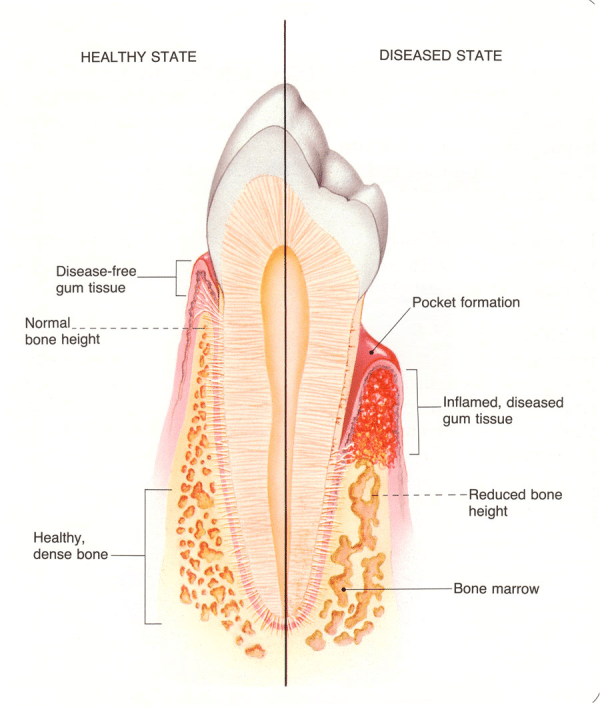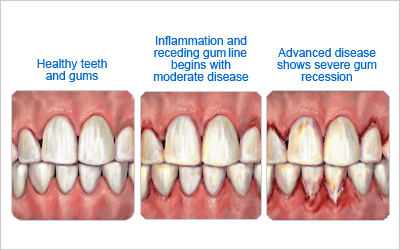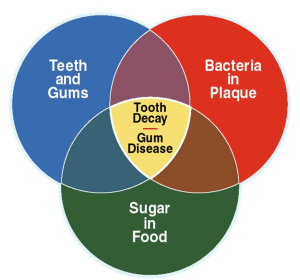 Gum disease = Serious Infection in Your Mouth
Gum disease = Serious Infection in Your Mouth
Gum disease is a chronic infection of the tissue and bone supporting your teeth. Research has shown that nearly one in three U.S. adults aged 30 to 54 has some form of gum disease.
A frustrating fact for many dentists and hygienists, including those at Comfort Dental, is that the majority of those with some form of gum disease don’t even know it.
Gum disease can progress with little or no pain – if there were more discomfort, there’s a greater chance people would ensure it was addressed before more harmful affects take hold.
DO YOU HAVE THE WARNING SIGNS OF GUM DISEASE?
- Bleeding when brushing or flossing

- Bad breath
- Bad or metallic taste in your mouth, which is the result of bacteria chronically infecting the pockets surrounding the teeth
.
HOW THE PROCESS OF GUM DISEASE HAPPENS
It starts as bacterial plaque – a sticky, colorless film that constantly forms on your teeth is not removed. This film turns into a hard substance called calculus or tartar – which can take place in less than two days. Tartar can only be removed by a dentist or dental hygienist using special instruments.
The bacteria found in plaque can infect the gums and release toxins that cause redness and inflammation in the gums. If they are not eliminated, the inflammation and the toxins can destroy the tissues that support the teeth, including the bone. When this happens, the gums separate from the teeth, forming pockets that fill with even more plaque; causing more infection.
CONTRIBUTING FACTORS TO GUM DISEASE

- Smoking can significantly increase the risk of developing periodontal disease and can negatively affect treatment outcomes.
- Hormonal changes during pregnancy, puberty and menopause can cause the gums to become red, swollen and bleed easily.
- Genetics and a family history of periodontal disease indicate a greater likelihood of developing this disease.
- Stress can make it more difficult for the body to fight off infection, including periodontal disease.
- Medications such as oral contraceptives, antidepressants and certain heart medicine, can affect oral health.
- Destructive habits such as improper oral home care, oral piercing, drug or alcohol abuse can affect periodontal health.
- Poor nutrition can make it harder for the body to fight off infections.
- Systemic diseases that interfere with the body’s immune system may worsen the condition of the gums and supporting bone.
HOW CAN I HAVE GUM DISEASE? MY TEETH DON’T HURT.
Often periodontal disease is not characterized by pain until the most advanced stages when teeth become loose and localized abscesses form.
 WHY CAN’T I JUST HAVE A REGULAR CLEANING – THAT “FREE” KIND MY INSURANCE PAYS FOR?
WHY CAN’T I JUST HAVE A REGULAR CLEANING – THAT “FREE” KIND MY INSURANCE PAYS FOR?
A “regular cleaning”, also called a “prophy”, is for patients who have non-bleeding, healthy gum tissue with no pocketing (detachment) around teeth of more than 3 millimeters.
GET THE TREATMENT NEEDED
- Gingivitis, the mildest form of the disease, is reversible.
– TREATMENT: A debridement cleaning to remove the heavy tartar and bacteria – followed by visits with regular cleanings.
- Periodontal Disease is the more advanced stage, characterized by bone loss, has no cure as the body cannot regrow this bone. The goal of treatment is to stop the progression of the active disease and control the bacteria that cannot be completely removed.
– TREATMENT: A procedure called “scaling and root planning” which involves removing tarter and plaque from the root surface of the tooth where active bacterial infection exists to promote reduction of chronic infection – followed by periodontal maintenance visits.
 Comfort Dental is here to help you get ahead of potential gum disease. If you have gum disease symptoms our dentists and hygienists will help you get mouth healthy! Remember gum disease addressed early can be reversed – and gum disease addressed later can be controlled. Getting the gum infection under control will improve your overall health!
Comfort Dental is here to help you get ahead of potential gum disease. If you have gum disease symptoms our dentists and hygienists will help you get mouth healthy! Remember gum disease addressed early can be reversed – and gum disease addressed later can be controlled. Getting the gum infection under control will improve your overall health!
Please let us know if you have additional questions. We are here to help!






